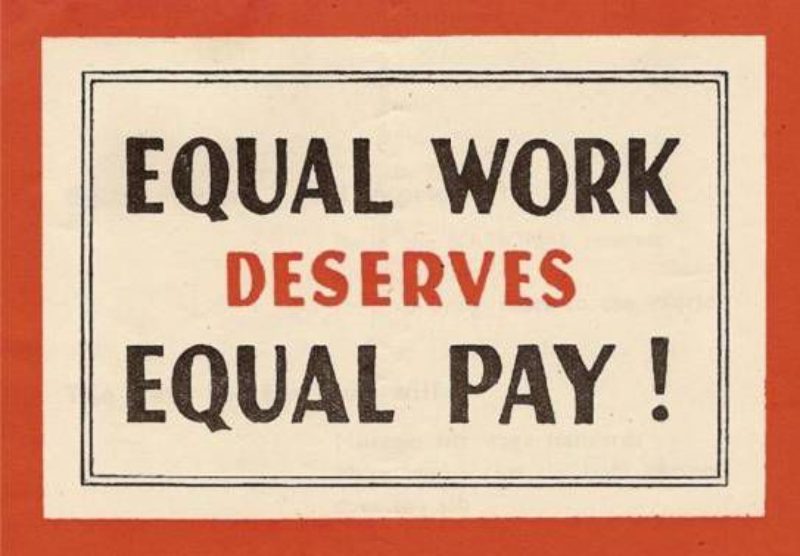Eastbourne Labour Party Eastbourne Labour Party

First: Some background
The 1964 Labour Party manifesto proposed a charter of rights that included ‘the right to equal pay for equal work’. Nothing much happened until the trigger event of the 1968 Ford sewing machinists’ strike which led to the 1970 Equal Pay Act which came into force on 29th December 1975. ‘Pay’ included: – wages; holidays; pension rights; and bonuses etc. But the Act only dealt with equal pay for the same work although due to the UK’s entry into the European Community, we needed to conform with Article 141 of the Treaty of Rome which stated ‘each Member State shall ensure that the principle of equal pay for male and female workers for equal work or work of equal value is applied.’ Later, with the 2010 Equality Act, the right to equal pay between women and men for equal work was firmly enshrined into UK law. The Made in Dagenham film came out at that time reminding us of the fights along the way to get there.
Women and the Economy
A meridian gender pay gap of 18% exists within the UK today; this is despite nearly 50 years of legislation following the Equal Pay Act of 1970. Society places higher values on jobs that are traditionally done by men than those traditionally done by women. Economic empowerment of women is fundamental for the well being of ALL members of society yet the Tory government is not effectively addressing the gender pay gap. 2018 marked the first year that women were able to submit a motion from the Women’s Conference to the main Conference. From the 23 subjects listed, the composite motion put forward was ‘Women and the Economy’. Unite the Union (together with other unions, CLPs and affiliated groups) submitted to this motion. Issues highlighted were
- Women form the majority of those in poverty.
- Nearly two thirds of those earning below the real Living Wage are women.
- Women continue to be paid less than men and have borne 86% of the austerity cuts.
- Women form the majority of people on zero hours contracts and in insecure work -widespread in sectors where women predominate, such as care, retail and hospitality.
- Pay insecurity places women at greater risk of sexual and other forms of harassment, violence and abuse.
- Systematic and structural discrimination in the labour market has led to exclusion of Black women from economic and political power in society.
- Despite fifty years of anti-discrimination, race and equality legislation, there is a higher gender and racial pay gap among Black women.
- Black African women have seen virtually no progress since the 1990s in closing
the gender pay gap with White British men, with a full-time pay gap of 21.4% in
the 1990s and 19.6% today. When part-time workers are included, this figure rises to 24%. - Pakistani and Bangladeshi women experience the largest aggregate (i.e. including full-time and part-time workers) gender pay gap at 26.2%.
- Indian women experience the biggest pay gap with men in their ethnic group
at 16.1%.
The Glasgow Women Strikers
This week, on 23 and 24 October we saw the largest equal pay strike since the Equal Pay Act was passed. Around 8,000 low-paid women in Glasgow, all joined together to take action over the city council’s failure to settle a long-standing equal-pay dispute. Included were: – school administration workers, learning support workers in schools, nursery workers, home carers, cleaners, caterers and other council workers. The strike affected schools, nurseries, home care, cleaning and catering across the city (though full life and limb service was maintained). The women have been waiting 14 years for this long overdue Equal Pay settlement and enough was enough. They were paid up to £3 an hour less than council staff in male-dominated but broadly equivalent roles such as bin collecting and street sweeping. Some estimates suggest they are owed hundreds of millions of pounds in back pay. About 600 mostly male refuse workers and others showed their solidarity and refused to cross the picket lines causing some concern from the council who were keen to point out this was illegal. The unions in turn pointed out that nothing illegal had happened. Secondary picketing had not been organised by the unions but instead it was individual conscience that had invoked such solidarity. This is what people power in the fight for equality looks like. This battle ground: equal pay for equal work and women have led the way.
Call out to Activists
We all know that the fight for equality across our society is broader than each individual battle. There is much to do and a long way to go. Please do all you can to help.
If you haven’t yet joined the Labour Party, please do: https://join.labour.org.uk/ .
There are many ways you can join in locally: https://www.facebook.com/EastbourneLabour/ .
If you haven’t yet joined a union please do.
If you would like to join a Union but are unwaged you can join Unite Community: https://unitetheunion.org/community .
You are most welcome to join us at our Unite Community Eastbourne Group and help us plan and organise events (or just come along to find out more):
https://www.facebook.com/Eastbourne-Unite-Community-Group-172511896695404/
Carol Mills/Unite Community Rep
